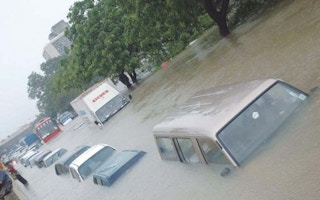Ten cities across Asia are set to launch a new project that will help local planners determine if their cities and people are protected from the effects of climate change.
The Asian Cities Climate Change Resilience Network (ACCCRN), with the support of The Rockefeller Foundation, said on Tuesday it will be revealing a set of ‘climate change resilience indicators’ over the coming months that will help local governments and NGOs implement initiatives to cope with the impacts of extreme weather conditions and other climate hazards.
These indicators - the first of its kind - are based on technical data such as the capacity of water supply systems, coverage of sewerage and solid waste services, and socioeconomic factors such as households qualifying for piped water distribution.
The cities in India, Indonesia, Thailand and Vietnam are each creating their own set of indicators, which include about 40 different types of information, to meet their specific needs and they will be the first urban areas in the world to apply these tools.
Local governments in the participating cities – which include Gorakhpur, Indore and Surat in India; Bandar Lampung and Semarang in Indonesia; Chiang Rai and Hat Yai in Thailand; and Da Nang, Can Tho and Quy Nhon in Vietnam – will analyse information on the systems and services most crucial to withstanding and recovering from climate hazards such as sea level rise, droughts and flooding.
The indicators, developed with the help of the United States-based Institute for Social and Environmental Transition (ISET), willact as guidelines for cities to monitor change in a number of key areas including resilience to climate hazards and in sectors such as public health, water supply and mangrove areas.
Once the pilot cities have shown the practical value of the project in preparing cities for climate change, they can serve as model for others, said Dr Stephen Tyler of the Institute for Social and Environmental Transition (ISET) in a statement.
The US-based ISET is one of the non-government organisation (NGO) partners for ACCCRN, which is part of a $70 million, five-year climate change initiative by The Rockefeller Foundation.
ACCCRN is a network of Asian cities established in 2008 to find practical solutions to the overlapping problems presented by climate change, poverty and poor infrastructure in Asia’s growing cities.
“The significance of this project doesn’t just lie with the indicators themselves, but with the fact that local planners are gaining a deeper understanding of key climate resilience issues and how to address them locally,” said Dr Tyler.
Dr Tyler noted at recent Planet Under Pressure event in London, that despite having the largest number of people at risk, cities were often ignored in climate change adaptation projects. With large, rapidly growing populations and expensive infrastructure at risk, Asian cities needed to increase its climate change resilience, he added.
In the Indonesian port city of Bandar Lampung on the island of Sumatra, where fishermen say their catch has shrunk in recent years to a quarter of what it used to be, ACCCRN is working with the local government on projects that raise awareness of climate issues, provide training and sources of income for the poor, and reduce climate hazard impacts.
One such project is a solid waste management system to reduce the waste that clogs waterways and increases the risk of disease.
Another example from Bandar Lampung involves land rehabilitation to relieve the flooding and erosion problems that are affecting the many poor who have built houses on low-lying, reclaimed land.
In the Indian city of Gorakhpur, where one third of the population of 676,000 lives in slums, inadequate drainage and sewer systems have caused frequent flooding and stagnant water. The resulting water contamination has led to increasing levels of water-borne diseases.
ACCCRN and its partners plan to work with the city to improve water infrastructure and better monitor sanitation and health issues.
Shiraz Wajih, president of the Gorakphur Environmental Group – an ACCCRN project partner – said the project would push local governments to realise how much more needed to be done to effectively deal with climate change-related issues.
“This will make a big difference to the communities that we want to help most. It will significantly improve the health and lives of the urban poor,” he added.

















